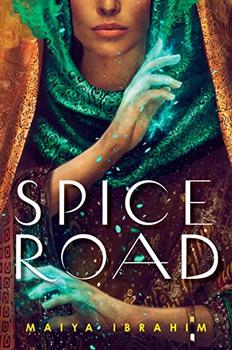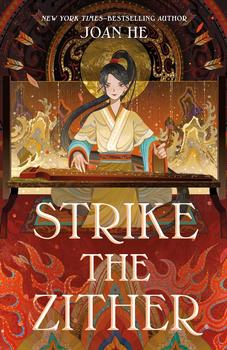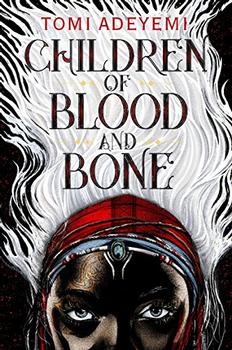Summary | Excerpt | Reviews | Beyond the book | Read-Alikes | Genres & Themes | Author Bio

Spice Road #1
by Maiya IbrahimImani is a Shield, a warrior who is renowned for her fighting abilities and for her iron dagger, with which she has a special bond. Her reputation, however, has been tarnished by her older brother, Atheer. After being accused of stealing, Atheer disappeared, leaving Imani and her family heartbroken at his supposed death. When Imani finds proof that Atheer may not only be alive but fighting a war in the kingdom of Alqibah — a kingdom the Council of Qalia claim doesn't exist — she embarks on a mission to bring him back. Accompanied by Taha, a rival Shield who holds a grudge, and Qayn, a magical djinni whose long past holds many secrets, Imani must discover how far she's willing to go to reunite her family. Maiya Ibrahim's Spice Road is a magical debut and a thrilling start to the Spice Road trilogy.
One of the novel's most interesting features is the city of Qalia's magic system, which is centered on drinking a special tea called misra or the Spice. Individuals who drink the tea are temporarily granted a supernatural ability to use in defense of Qalia, with abilities ranging from shapeshifting or speaking with animals to elemental control or an affinity for weapons. Although the Spice is supposed to be reserved for use by Shields, other individuals who drink it also display an ability. Thus the tea itself — rather than any quality inherent in the drinker — provides the power, revealing not only why the supply of misra tea is so tightly controlled, but also why Atheer's theft of the Spice causes such concern. The nature of these superpowers — granted by an external source and lasting only as long as the tea is in the drinker's system — sets them apart from special abilities found in other young adult fantasies.
Since this is the first book in a trilogy, Ibrahim spends a lot of time developing this fantasy world as well as setting up the conflicts that will feature in the next two books. Ibrahim effectively uses small details to help create a setting that feels entirely real. Readers will feel the heat and emptiness of the Forbidden Wastes, smell the myriad spices in the bazaar and shudder at the brokenness and despair of those whose lives have been destroyed by the war in Alqibah. The narrative also takes pains to show the similarities between the people of Qalia and those in Alqibah, which serve as justification for Atheer's actions as well as Imani's in the book's latter half. Additionally, the impact that the war in Alqibah will have on Qalia is made clear, providing the groundwork for the major action in the remainder of the trilogy. Thus, although the conflict feels a bit simplistic in this volume, the plot suggests that the story will grow in complexity and scope as the saga continues.
Ibrahim's skill at character development also indicates her ability to develop a story with complexity and nuance. Imani, who has lived a privileged life, is initially rather naïve, refusing to believe anything but the best about her brother and her family. Her views change, however, as Taha forces her to face not only the prejudices she holds against him and his supposedly lesser clan, but also the ways in which Atheer's acions have placed Qalia in danger. Her rose-colored view of the Council and their long-held laws also fades as she learns more of Qayn's story and the truth about the magical beings which she as a Shield has been tasked to kill. This shift in character is a bit drawn out, as the traveling party is often beset by monsters and dangerous magic, but the Imani at the end of the story is far different from the one in the story's opening pages. One thing that does not change, however, is her love for her family.
The theme of family plays a significant role throughout; in Imani's case, family provides the initial motivation for her mission, in contrast with the more antagonistic family relationship between Taha and his father explored later in the book. The differences between Imani and Taha's families are stark and serve as realistic and tragic catalysts for the two Shields' drastically different choices in the novel. Ibrahim will surely continue to focus on the ways family can influence a person's choices in the next two novels.
Spice Road does have its flaws: there should be more showing than telling, and the ending is a bit abrupt. Also, considering that the characters are the most gifted Shields in their generation, they read young and somewhat immature: instead of focusing on their mission, Imani and her travel companions constantly bicker over who would beat whom and tease one another about crushes. Nevertheless, Ibrahim has, overall, written a wonderful debut filled with unique magic, vivid imagery, and extensive worldbuilding that will appeal to fans of fantasy, strong female leads, and unbreakable family bonds.
![]() This review was originally published in The BookBrowse Review in March 2023, and has been updated for the
May 2024 edition.
Click here to go to this issue.
This review was originally published in The BookBrowse Review in March 2023, and has been updated for the
May 2024 edition.
Click here to go to this issue.

If you liked Spice Road, try these:

by Joan He
Published 2024
A dazzling new fantasy from New York Times and Indie bestselling author Joan He, Strike the Zither is a powerful, inventive, and sweeping fantasy that reimagines the Chinese classic tale of the Three Kingdoms.

by Tomi Adeyemi
Published 2019
Winner of the 2018 BookBrowse Award for Best Young Adult Novel
Tomi Adeyemi conjures a stunning world of dark magic and danger in her West African-inspired fantasy debut, perfect for fans of Leigh Bardugo and Sabaa Tahir.
Flaming enthusiasm, backed up by horse sense and persistence, is the quality that most frequently makes for ...
Click Here to find out who said this, as well as discovering other famous literary quotes!
Your guide toexceptional books
BookBrowse seeks out and recommends the best in contemporary fiction and nonfiction—books that not only engage and entertain but also deepen our understanding of ourselves and the world around us.